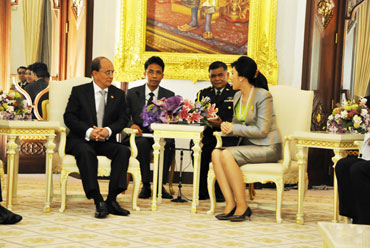Thailand submitted a coordination plan to Burma last week involving construction of the US$ 60 billion Dawei deep-sea port project and special economic zone.
 Sihasak Phuangketkaew, the Thai permanent secretary for foreign affairs, said he submitted a concept paper to Burma outlining how the two countries will cooperate in the huge energy and industrial project in southeast Burma.
Sihasak Phuangketkaew, the Thai permanent secretary for foreign affairs, said he submitted a concept paper to Burma outlining how the two countries will cooperate in the huge energy and industrial project in southeast Burma.
A MoU agreement was signed by Prime Minister Yingluck Shinawatra and Burmese President Thein Sein in Thailand last month.
“Both governments should work together under the newly proposed mechanism to support the Dawei project together with Thailand's Eastern Seaboard,” Sihasak told the Bangkok Post, in an article published on Wednesday.
“Thailand wants the mechanism to engage high-level officials of the two countries,” he said.
Sihasak said a Thai coordination team would return to Burma for further consultation before Thai Prime Minister Yingluck Shinawatra visits Burma on Sept 19-21 to launch the Dawei and western seaboard projects.
He said the two countries will focus on infrastructure building, construction of industrial estates, energy cooperation and developing regulations on the transportation of goods across the border.
Sihasak said the Thai plan includes cooperation on community development in areas adjacent to the Dawei site, vocational training, relocation of local residents, academic issues, education and public health assistance.
Thailand will also help the Italian-Thai Development Plc, the contractor for the project, to find foreign investors and capital to construct the deep-sea port, he said.
“The Thai government is trying to raise the project's profile to create visibility in foreign countries,” he said.
The development of Burma’s Dawei special economic zone will be the focus of a two-day trip to Naypyitaw by Shinawatra.
The joint development of the deep-sea port project in southeast Burma and the plan to connect the Dawei project to Thailand's Laem Chabang deep-sea port project would be the focus of discussions, officials said.
The recent bilateral agreements on Dawei have sent a strong signal to foreign investment firms and governments that Thailand and Burma are committed to the development of the strategic economic corridor designed to funnel energy and other material into Southeast Asia, significantly reducing shipping time and costs.
About US$ 8.6 billion is needed for investment in the initial infrastructure project prior to the creation of the Dawei project proper, which will provide jobs for more than 1,000 Burmese workers, officials said.
The Dawei deep sea-port, industrial zone and road and rail links to Thailand includes construction of the Dawei deep sea-port, buildings for shipyard and maintenance works, establishment of petrochemical industries, an oil refinery, steel plant, power stations and a Dawei-Bangkok motor road and railroad, in addition to the laying of oil pipelines along the motorway and railroad, according to the framework agreement.
The project, to be completed by 2018, is designed to bypass the Malacca Strait and shorten the transportation route to Southeast Asia and the Pacific.


